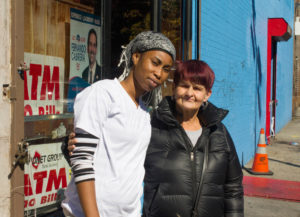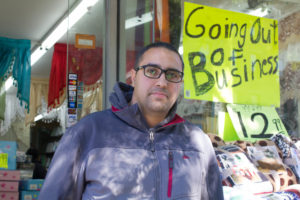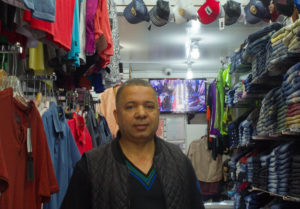The intersection of Burnside Avenue and Jerome Avenue is the fulcrum of a shopping strip in the throes of development. On one side stands the dog-eared Nams, a dingy odds and ends shop with scratched suitcases chained up on display outside. On an opposite corner is Bred, a self-proclaimed ‘urban style’ store whose brand-marked shoes and clothes stare down on brightly lit, air-conditioned floor space.
“Burnside Avenue isn’t currently a commercial street; at least, not really,” said Khalid Omar, the owner of Burnside Furniture. The West Bronx thoroughfare is a low key but extraordinarily diverse small business hub: home to a variety of modest eateries and home, clothing and convenience stores. Many are run by immigrants from the area’s thriving West African, Arab and Latino communities.
But existing small businesses are soon likely to be joined by a mix of citywide and national competitors under city plans for commercial revitalization, community efforts to create a Business Improvement District, or both.
Plans to rezone Jerome Avenue to create thousands of affordable new homes contain blueprints to spruce up ‘commercial corridors’ on some of the streets that straddle it, including Burnside. The commercial corridor proposals tie into a wider program, currently being finalized by the city’s Department of Small Business Services, which would work with local stores to help them market themselves and to make their environment safer, cleaner and more attractive.
“We’ll be asking for more security, lighting and cleanliness to offer to the community as a whole, making it a place where people enjoy coming to shop,” said Ubaldo Santos, a tax preparer who is president of the Merchants Association on Burnside Avenue. He talks slowly in lilting, accented English, but with a conviction that reflects his desire to improve the neighborhood that has been his home for over 30 years.
Some store owners and managers clearly want to see these improvements too. “Change is good. Beauty is good. It makes you feel proud of where you are,” said Georgina Tackie, the assistant manager of Accra, a Ghanaian restaurant on the corner of Burnside and Davidson Avenues.
Others, however, are skeptical of city-driven commercial plans. Ayoub Hammouda, a Palestinian immigrant who manages Burnside Linen, said city agencies frustrate his business rather than help it grow.
“The Department of Sanitation bothers us,” said Hammouda, complaining that the agency won’t let him display his merchandise on the street. He stood beside a prominent bright green ‘Going Out of Business’ sign in his shop window. “They just want to give us tickets.”
Plans to revitalize Burnside Avenue are not limited to city authorities. “We’ve been fighting for a number of years to convert Burnside Avenue into a Business Improvement District,” said Santos, who has been working on the plans with the Davidson Community Center and Morris Heights Health Center.
Business Improvement Districts, or BIDs, are public-private partnerships run chiefly by property owners and merchants. Santos is hopeful that BID status for Burnside might be finalized next year. “We’ve been working very actively with the Small Business Service and they’ve been working very diligently with us,” he said.
BIDs, however, are controversial. Critics say they give landlords too much power over small business owners. “Businesses often don’t want their neighborhood to become a BID, but it doesn’t matter what the tenants think,” said Moshe Adler, an adjunct associate professor of urban planning at Columbia University. “You’d be hard-pressed to find one example where businesses consider this to be an improvement. It’s just a misleading name.”
And some businesses on Burnside Avenue are afraid property owners will use aesthetic improvements as an excuse to drive up rent, whether they’re attached to BID status or not.
“The rent is the main issue, not shop fronts or advertising,” said Omar at Burnside Furniture. “Whatever they are trying to do is difficult when the rent is too high. It’s the main issue.”
In the area affected by the Jerome Avenue rezoning, at least 90 percent of businesses rent their store space. Forty two percent of respondents to a recent survey said real estate and lease assistance would be valuable to them.
Merchants’ concerns that development could destabilize small businesses have recent local precedent.
Even though plans to turn Kingsbridge Armory into America’s largest ice rink have stalled due to a funding dispute, some businesses on adjacent Kingsbridge Avenue report that landlords’ behavior has changed dramatically since the project was announced in 2012.
“Rent nearly doubled this year,” said Espi Sanchez, a waitress at New Capital diner on the corner of Kingsbridge and Jerome Avenues. “Many businesses near here have closed.”
“The owner is nervous. We are nervous,” said Jose Nunez as he buzzed a trimmer close to a customer’s scalp in Kingsbridge Barber Shop. “You don’t know if you’re working here one day and gone the next.”
Many owners have a bigger problem with property owners refusing to commit to long-team leases. “Landlords are being pre-emptive in not renewing leases. I can feel it,” said Patrick Lim, who owns two grocery stores opposite the Armory.
The Department of Small Business Services said it is offering leasing workshops and pro bono legal advice to affected businesses. It has not, however, stipulated what support will be on offer should rents become so eye-watering that businesses can no longer afford to stay open. Many fear that their store space will go to big chain companies if they are forced to move away.
“Big corporations kill small commercials,” said Miguel Angel, a merchant who sells clothing to shops like Rudy Fashion on Burnside Avenue. “Ten years ago this neighborhood was all small commercials. Now there are lots of big commercials.”
Newer chain stores appear to be thriving on Burnside. Jimmy Jazz, an apparel store with outlets across the country, is currently planning to move into a bigger unit across the road from its current location.
“We’re making too much money to stay here,” said Dylan Chevalier, its branch assistant manager.
Santos at the Merchants Association, however, is hopeful that small businesses won’t be forced to leave by higher rents. “It doesn’t pay for the landlord to raise the rent to the roof so that no one can afford it,” he said. “That way everybody loses. Property owners need to understand that and work with us.”
He insisted, however, that local business owners need to come together too to shape the plans. “I’m willing to do it and I think others are too,” said Santos of neighboring businesses. “I have lived in this community for many years. I raised my children here. But we have to give back to our community as well. You have to take part.”





